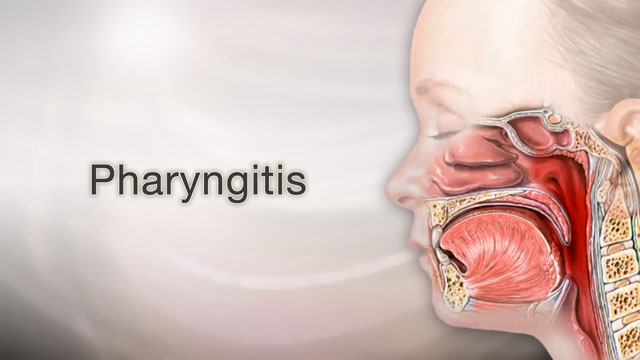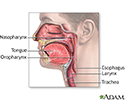Pharyngitis - viral
Pharyngitis is swelling in the throat at and just below the tonsils that causes discomfort, pain, or scratchiness. It is often called a "sore throat".

Pharyngitis may occur as part of a viral infection that also involves other organs, such as the lungs or bowel.
Most sore throats are caused by viruses.
Symptoms
Symptoms due to or associated with pharyngitis may include:
- Discomfort when swallowing
- Fever
- Joint pain or muscle aches
- Sore throat
- Tender swollen lymph nodes in the neck
Exams and Tests
Your health care provider usually diagnoses viral pharyngitis by examining your throat. A lab test of fluid from your throat will show that bacteria (such as group A streptococcus, or strep) is not the cause of your sore throat.
Treatment
There is no specific treatment for viral pharyngitis. You can relieve symptoms by gargling with warm salt water several times a day (use one half teaspoon or 3 grams of salt in a glass of warm water). Taking acetaminophen, or an anti-inflammatory medicine such as ibuprofen, can control fever. Excessive use of anti-inflammatory lozenges or sprays may make a sore throat worse.
It is important to NOT take antibiotics when a sore throat is due to a viral infection. The antibiotics will not help. Using them to treat viral infections helps bacteria become resistant to antibiotics.
With some sore throats (such as those caused by infectious mononucleosis), the lymph nodes in the neck may become very swollen. Your provider may prescribe anti-inflammatory drugs, such as prednisone, to treat them.
Outlook (Prognosis)
Symptoms usually go away within 7 to 10 days.
Possible Complications
Complications of viral pharyngitis are extremely uncommon.
When to Contact a Medical Professional
Make an appointment with your provider if symptoms last longer than expected, or do not improve with self-care. Always seek medical care if you have a sore throat and have extreme discomfort or difficulty swallowing or breathing.
Prevention
Most sore throats cannot be prevented because the germs that cause them are in our environment. However, always wash your hands after contact with a person who has a sore throat. Also avoid kissing or sharing cups and eating utensils with people who are sick.
References
Allen CT, Nussenbaum B, Merati AL. Acute and chronic laryngopharyngitis. In: Flint PW, Francis HW, Haughey BH, et al, eds. Cummings Otolaryngology: Head and Neck Surgery. 7th ed. Philadelphia, PA: Elsevier; 2021:chap 61.
Flores AR, Caserta MT. Pharyngitis. In: Bennett JE, Dolin R, Blaser MJ, eds. Mandell, Douglas, and Bennett's Principles and Practice of Infectious Diseases. 9th ed. Philadelphia, PA: Elsevier; 2020:chap 59.
Roginski MA, Atchinson PR. Upper respiratory tract infections. In: Walls RM, ed. Rosen's Emergency Medicine: Concepts and Clinical Practice. 10th ed. Philadelphia, PA: Elsevier; 2023:chap 61.
Tanz RR. Acute pharyngitis. In: Kliegman RM, St. Geme JW, Blum NJ, Shah SS, Tasker RC, Wilson KM, eds. Nelson Textbook of Pediatrics. 21st ed. Philadelphia, PA: Elsevier; 2020:chap 409.
Review Date: 2/8/2024










